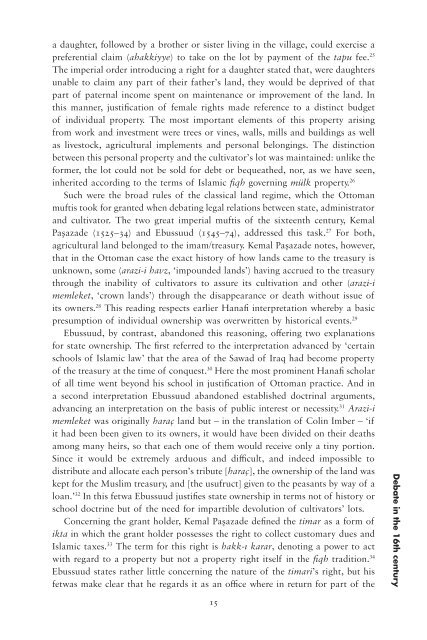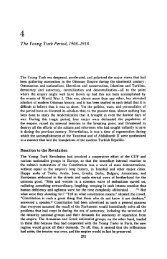Governing property, making the modern state - PSI424
Governing property, making the modern state - PSI424
Governing property, making the modern state - PSI424
Create successful ePaper yourself
Turn your PDF publications into a flip-book with our unique Google optimized e-Paper software.
a daughter, followed by a bro<strong>the</strong>r or sister living in <strong>the</strong> village, could exercise a<br />
preferential claim (ahakkiyye) to take on <strong>the</strong> lot by payment of <strong>the</strong> tapu fee. 25<br />
The imperial order introducing a right for a daughter <strong>state</strong>d that, were daughters<br />
unable to claim any part of <strong>the</strong>ir fa<strong>the</strong>r’s land, <strong>the</strong>y would be deprived of that<br />
part of paternal income spent on maintenance or improvement of <strong>the</strong> land. In<br />
this manner, justification of female rights made reference to a distinct budget<br />
of individual <strong>property</strong>. The most important elements of this <strong>property</strong> arising<br />
from work and investment were trees or vines, walls, mills and buildings as well<br />
as livestock, agricultural implements and personal belongings. The distinction<br />
between this personal <strong>property</strong> and <strong>the</strong> cultivator’s lot was maintained: unlike <strong>the</strong><br />
former, <strong>the</strong> lot could not be sold for debt or bequea<strong>the</strong>d, nor, as we have seen,<br />
inherited according to <strong>the</strong> terms of Islamic fiqh governing mülk <strong>property</strong>. 26<br />
Such were <strong>the</strong> broad rules of <strong>the</strong> classical land regime, which <strong>the</strong> Ottoman<br />
muftis took for granted when debating legal relations between <strong>state</strong>, administrator<br />
and cultivator. The two great imperial muftis of <strong>the</strong> sixteenth century, Kemal<br />
Paşazade (1525–34) and Ebussuud (1545–74), addressed this task. 27 For both,<br />
agricultural land belonged to <strong>the</strong> imam/treasury. Kemal Paşazade notes, however,<br />
that in <strong>the</strong> Ottoman case <strong>the</strong> exact history of how lands came to <strong>the</strong> treasury is<br />
unknown, some (arazi-i havz, ‘impounded lands’) having accrued to <strong>the</strong> treasury<br />
through <strong>the</strong> inability of cultivators to assure its cultivation and o<strong>the</strong>r (arazi-i<br />
memleket, ‘crown lands’) through <strong>the</strong> disappearance or death without issue of<br />
its owners. 28 This reading respects earlier Hanafi interpretation whereby a basic<br />
presumption of individual ownership was overwritten by historical events. 29<br />
Ebussuud, by contrast, abandoned this reasoning, offering two explanations<br />
for <strong>state</strong> ownership. The first referred to <strong>the</strong> interpretation advanced by ‘certain<br />
schools of Islamic law’ that <strong>the</strong> area of <strong>the</strong> Sawad of Iraq had become <strong>property</strong><br />
of <strong>the</strong> treasury at <strong>the</strong> time of conquest. 30 Here <strong>the</strong> most prominent Hanafi scholar<br />
of all time went beyond his school in justification of Ottoman practice. And in<br />
a second interpretation Ebussuud abandoned established doctrinal arguments,<br />
advancing an interpretation on <strong>the</strong> basis of public interest or necessity. 31 Arazi-i<br />
memleket was originally haraç land but – in <strong>the</strong> translation of Colin Imber – ‘if<br />
it had been been given to its owners, it would have been divided on <strong>the</strong>ir deaths<br />
among many heirs, so that each one of <strong>the</strong>m would receive only a tiny portion.<br />
Since it would be extremely arduous and difficult, and indeed impossible to<br />
distribute and allocate each person’s tribute [haraç], <strong>the</strong> ownership of <strong>the</strong> land was<br />
kept for <strong>the</strong> Muslim treasury, and [<strong>the</strong> usufruct] given to <strong>the</strong> peasants by way of a<br />
loan.’ 32 In this fetwa Ebussuud justifies <strong>state</strong> ownership in terms not of history or<br />
school doctrine but of <strong>the</strong> need for impartible devolution of cultivators’ lots.<br />
Concerning <strong>the</strong> grant holder, Kemal Paşazade defined <strong>the</strong> timar as a form of<br />
ikta in which <strong>the</strong> grant holder possesses <strong>the</strong> right to collect customary dues and<br />
Islamic taxes. 33 The term for this right is hakk-ı karar, denoting a power to act<br />
with regard to a <strong>property</strong> but not a <strong>property</strong> right itself in <strong>the</strong> fiqh tradition. 34<br />
Ebussuud <strong>state</strong>s ra<strong>the</strong>r little concerning <strong>the</strong> nature of <strong>the</strong> timari’s right, but his<br />
fetwas make clear that he regards it as an office where in return for part of <strong>the</strong><br />
15<br />
Debate in <strong>the</strong> 16th century












